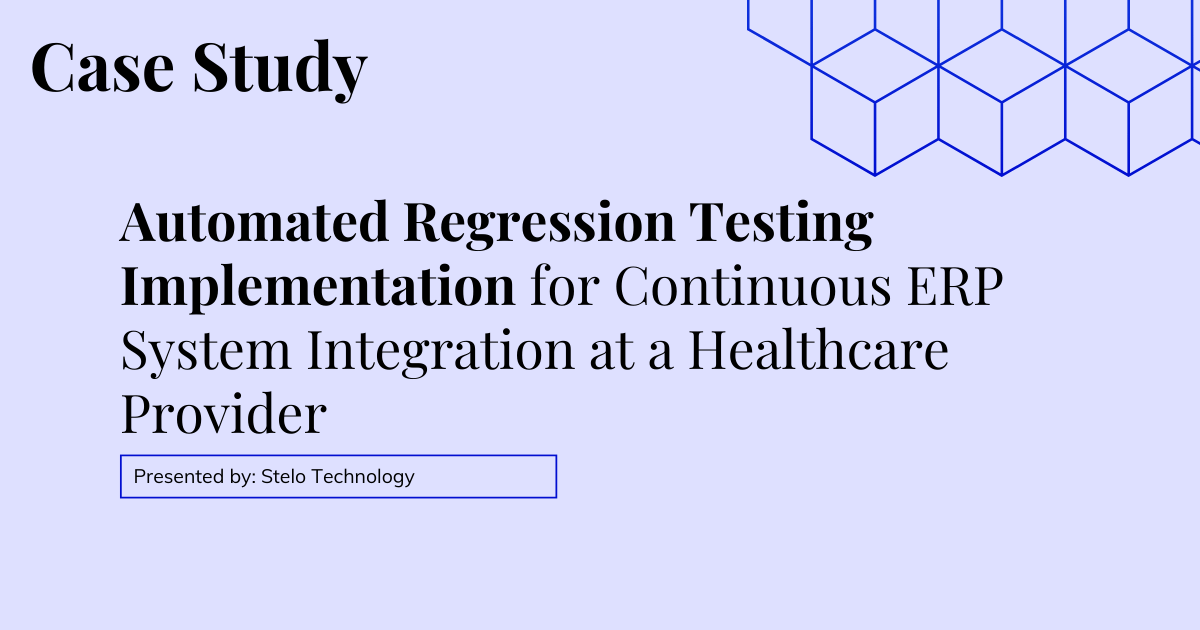A leading healthcare provider recognized the need to enhance their Enterprise Resource Planning (ERP) system’s agility and responsiveness to change. This case study outlines the Automating ERP Testing for Healthcare implementation of an automated regression testing framework designed to support continuous integration and deployment (CI/CD) processes, aimed at maintaining system stability and functionality amidst frequent updates.
Objective of Automating ERP Testing for Healthcare
The primary objective was to develop and implement an automated regression testing framework that integrates with existing CI/CD pipelines to ensure the ERP system’s continuous stability and performance after each update and modification.
Scope
The scope of the project included the creation and implementation of automated test scripts specifically tailored for regression testing to verify the ERP system’s integrity following updates and changes.
Challenges
- Complex System Interdependencies: The ERP system had multiple integrations with other internal and external systems, making it complex to manage dependencies and ensure comprehensive test coverage.
- Legacy System Constraints: Parts of the ERP system were based on older technology, which posed challenges in integrating modern automation tools.
- Resource Limitations: Limited testing resources and expertise in automated testing within the healthcare provider’s IT team.
- High Expectations for Stability: The critical nature of the healthcare provider’s operations demanded high system stability, putting additional pressure on the testing process to prevent disruptions.
Solutions

- Tool Selection: After evaluating several tools, Selenium and Jenkins were chosen for their robustness and compatibility with the existing technology stack. Selenium allowed for flexible script development, while Jenkins facilitated integration with the CI/CD pipeline.
- Development of Test Scripts: A team of QA engineers developed automated regression test scripts designed to cover all critical functionalities of the ERP system. These scripts were designed to be reusable and easily updated.
- Continuous Integration Environment Setup: Jenkins was set up to automate the execution of regression tests each time changes were committed to the system, allowing for immediate feedback and rapid iteration.
- Training and Knowledge Transfer: To address the skill gap, the internal team was provided with training on automated testing principles and the specific tools adopted. External consultants were brought in during the initial phases to ensure a smooth transition and setup.
Key Activities
- Tool Integration: Integrating Selenium and Jenkins with the existing ERP system and CI/CD pipeline.
- Script Development and Maintenance: Continuous development, testing, and updating of automated test scripts to adapt to new system requirements and updates.
- Automated Test Execution: Regular execution of regression tests through Jenkins to validate system functionality after each update.
- Feedback Loop Establishment: Setting up a robust feedback mechanism to quickly identify and address issues found during testing.
Ready to enhance your software quality and accelerate your time to market? Contact us today at sales@stelotechnology.com to request a customized quote for your business!
Outcomes
- Reduced Testing Cycle Times: Automation reduced the regression testing cycle from several days to a few hours, significantly speeding up the CI/CD process.
- Consistent System Validation: Automated regression testing ensured that every system update was thoroughly validated, maintaining system stability and functionality.
- Accelerated Feature Delivery: With faster and reliable testing cycles, the healthcare provider was able to roll out new features and enhancements more quickly, improving response to healthcare demands.
- Enhanced Error Detection: Early detection of defects helped prevent potential disruptions in healthcare services, contributing to higher overall system reliability.
Conclusion
The implementation of an automated regression testing framework transformed the healthcare provider’s approach to ERP system updates. Through strategic tool selection, thorough training, and continuous improvement of testing processes, the provider now enjoys a more resilient and dynamic ERP system.
This initiative not only supports immediate operational needs but also positions the healthcare provider to better meet future challenges and opportunities.


